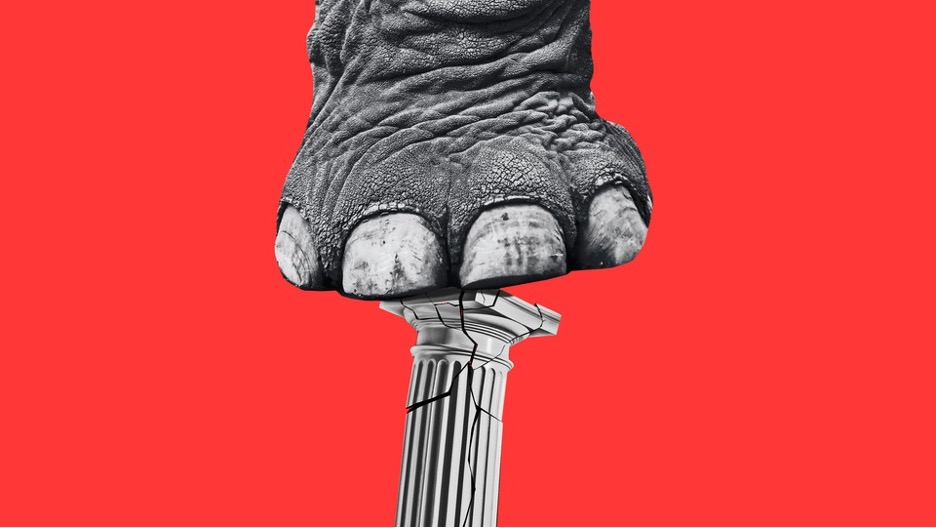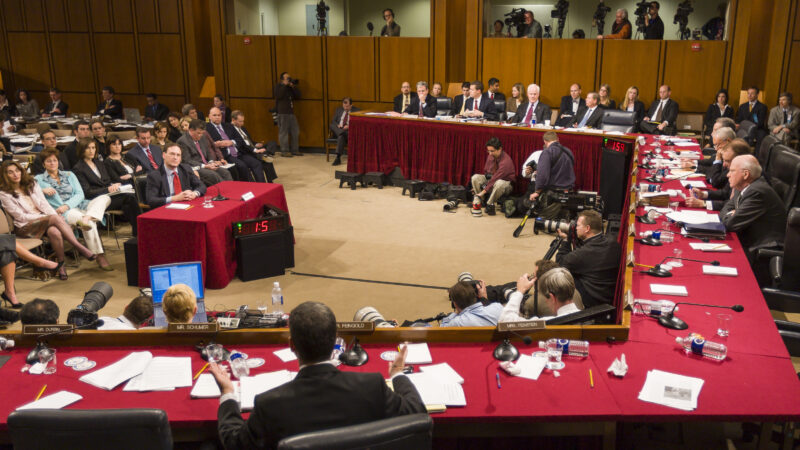Steven Levitsky is David Rockefeller Professor of Latin American Studies and Professor of Government at Harvard University. He is an advisor to Protect Democracy
How Democracy Could Die in 2024, and How to Save It
- July 9, 2021

This essay is part of Protect Democracy’s Democracy Endgame series, in which leading thinkers were invited to offer their own views on possible paths out of the United States’ democratic crisis. This essay reflects solely the viewpoint of its author and not of his affiliated institutions or of Protect Democracy.
The greatest threat to American democracy today is the possibility of a stolen presidential election. As we argued in our 2018 book, contemporary democracies die often at the ballot box, through measures that are nominally constitutional. As horrific as the January 6 assault on the Capitol was, American democracy is unlikely to fall victim to a violent insurrection. Rather than extremist militias overrunning the Capitol, we should primarily be alert to mainstream Republicans “legally” overturning elections.
The threat to democracy in the U.S. today is worse than we anticipated when we wrote How Democracies Die. We knew Donald Trump was an authoritarian figure, and we held the Republican Party responsible for abdicating its role as democratic gatekeeper. But we did not consider the Republicans to be an anti-democratic party.
Four years later, however, the bulk of the Republican Party is behaving in an anti-democratic manner, and could very well overturn a presidential election. This scenario would represent a lethal “heart attack” for American democracy. And just like responding to an actual heart attack, it requires that we address both the acute crisis and underlying longer-term conditions that give rise to it. Working on these two fronts simultaneously are the two central tasks facing defenders of American democracy today.
Surviving the short-term threats to elections
For the first time in U.S. history, a sitting president refused to accept defeat and attempted to overturn the election results. But rather than oppose this attempted presidential coup, leading Republicans either cooperated with it or enabled it by refusing to publicly acknowledge Trump’s defeat. Leading Republicans also refused to break with the forces behind the January 6 assault on the Capitol. In the run-up to January 6, most of them refused to denounce extremist groups, which were spreading conspiracy theories, calling for armed insurrection and assassinations, and were ultimately implicated in the insurrection. Few Republicans broke with Trump after his incitement of the insurrection, and those who did were censured by their state parties.
Between November 2020 and January 2021, then, a significant portion of the Republican Party refused to unambiguously accept electoral defeat, eschew violence, or break with extremist groups—the three principles that define pro-democracy parties. Based on this behavior, as well as the GOP’s behavior over the last six months, we are convinced that the Republican Party leadership is willing to overturn an election. Moreover, we are concerned that it will be able to do so—legally.
As we argued in How Democracies Die, our constitutional system relies heavily on forbearance. Whether it is the filibuster, funding the government, impeachment, or judicial nominations, our system of checks and balances works when politicians on both sides of the aisle deploy their institutional prerogatives with restraint. In other words, they do not engage in constitutional hardball, or deploy the letter of the law in ways that subvert the spirit of the law. When contemporary democracies die, they usually do so via constitutional hardball. Democracy’s primary assailants today are not generals or armed revolutionaries, but rather politicians—Chavez, Putin, Orban, Erdogan—who eviscerate democracy’s substance behind a carefully-crafted veneer of legality and constitutionality.
How Democracies Die pointed to a troubling rise in constitutional hardball in the U.S., even before the rise of Trump. An example was Senate Republicans’ 2016 decision not to allow President Obama to fill the Supreme Court vacancy created by Justice Antonin Scalia’s death. The move was entirely legal, but in practice it amounted to stealing a Supreme Court seat. This is precisely what could happen in the 2024 election.
Electoral hardball can be devastating to a democracy. Elections require forbearance. For elections to be democratic, all adult citizens must be equally able to cast a ballot and have that vote count. It is strikingly easy to use the letter of the law to violate the spirit of this principle. Election officials can legally throw out large numbers of ballots based on the most minor of technicalities in the voting process (e.g., the oval on the ballot is not entirely penciled in or there is a typo or spelling mistake in the mail-in ballot form). Large-scale ballot disqualification may accord with the written letter of the law, but it is inherently anti-democratic, for it denies suffrage to a large number of voters. And crucially, if hardball criteria are applied unevenly, such that many ballots are disqualified in one party’s stronghold but not in other areas, it can turn an election.
Republican officials across the country are laying the legal infrastructure to engage in electoral hardball. Since January, according to Protect Democracy, Law Forward, and the States United Democracy Center, Republicans have introduced 216 bills (in 41 states) aimed at facilitating hardball tactics. As of June 2021, 24 of these bills have passed, including in the battleground states of Arizona, Florida, Georgia, and Texas. The approved measures allow Republican-controlled state legislatures or election boards to sideline or override local election administrations in Democratic strongholds. This would allow state legislatures or their appointees to meddle in local decision making, purge voter rolls, and manipulate the number and location of polling places. It would also allow Republicans in Arizona, Georgia, and elsewhere to do something Trump tried and failed to do in 2020: throw out ballots in rival strongholds in order to overturn a statewide result. Finally, the new laws impose criminal penalties for local election officials deemed to violate election procedure. This will enable statewide Republican officials to compel local officials to engage in electoral hardball via threats of criminal prosecution. Throwing out thousands of ballots in rival strongholds may be profoundly anti-democratic, but it is technically legal, and Republicans in several states now have a powerful stick to enforce such practices.
Republican politicians learned several things in the aftermath of the 2020 elections. First, they learned that our electoral system creates a plethora of opportunities for constitutional hardball—legal steps that can be used to overturn unfavorable election results. Trump failed at this in 2020, due to sheer incompetence, but his campaign to overturn the results revealed a variety of mechanisms that may be exploited in future elections. These cannot be unlearned. The soft underbelly of American democracy has been exposed. Second, Republicans learned that they would not be punished by their voters for attempting to steal an election. To the contrary, they learned that efforts to overturn an election would be rewarded by Republican voters, activists, local and state parties, and many donors.
The 2020 election may, in effect, have been a dress rehearsal for what is to come. All evidence suggests that if the 2024 election is close, the Republicans will deploy constitutional hardball to challenge or overturn the results in various battleground states. Recent history and public-opinion polling tell us that the Republican activist base will enthusiastically support—indeed, demand—electoral hardball tactics. And the new state election laws will facilitate them. Democratic strongholds in Republican-led battleground states—such as Arizona, Georgia, Texas, and possibly Michigan and Wisconsin—will be especially vulnerable. And if disputed state-level elections throw the election into the House of Representatives, it is likely that a Republican-led House would hand the election to the Republican candidate (no matter who actually won the election).
It is useful to compare this process to the evolution of the Supreme Court nomination process. Prior to 2016, it was almost unthinkable that an opposition-controlled Senate would simply refuse to allow the president to fill a Supreme Court seat. Indeed, nothing of the sort had occurred since 1866. And yet Republicans, secure in the knowledge that their behavior was legal, did the unthinkable: they stole a Supreme Court seat. Because the move was constitutional, there was nothing Democrats could do about it. A similar process could unfold around the 2024 election. Based on the GOP’s behavior since 2016, but especially since November 2020, there is every reason to think that Republicans are now willing to use constitutional hardball to overturn an election. And since the move would likely be deemed constitutional, there is likely nothing that Democrats would be able to do about it.
In sum, the absence of formal guardrails governing American elections leaves our democracy vulnerable to abuse. The system has faced crises before—including the disputed elections in 1824 and 1876. Given the considerable authority granted to state legislatures by the Constitution, the processes of voting, vote counting, and even the selection of electors can easily be subverted for partisan ends. It is thus critical that the electoral guardrails be hardened through federal legislation prior to the 2024 election.
To save democracy, democratize it
Beyond the acute crisis facing American democracy, however, is a deeper problem: the radicalization of the Republican Party. Unless and until the GOP recommits itself to playing by democratic rules of the game, American democracy will remain at risk. Each national election will feel like a national emergency. Therefore, the de-radicalization of the Republican Party is a central task for the next decade.
Normally, in a two-party democracy, if one party veers off course, it is punished at the ballot box. Electoral competition is thought to be a natural corrective for political extremism: Parties that stray too far from the average voter’s positions lose votes, which compels them to moderate and broaden their appeal to win again. When a professional sports team loses, it fires its coach, acquires new players, and regroups. The same should hold for political parties. Indeed, if you ask moderate or Never Trump Republicans what will get Republicans back on course, they will almost invariably answer “devastating electoral defeat.”
They may be right. There is a hitch, however: Competition’s effects are being undermined in the U.S. today by what political scientists call countermajoritarian institutions. We believe that the U.S. Constitution, in its current form, is enabling the radicalization of the Republican Party and exacerbating America’s democratic crisis. The Constitution’s key countermajoritarian features, such as the Electoral College and the U.S. Senate, have long been biased toward sparsely populated territories. But given that Democrats are increasingly the party of densely populated areas and Republicans dominate less populated areas, this long-standing rural bias now allows the Republican Party to win the presidency, control Congress, and pack the Supreme Court without winning electoral majorities. Consider these facts:
- Republicans have won the popular vote for the presidency only once since 1988, yet have governed the country for nearly half of that period.
- The Democratic and Republican Parties each control 50 seats in the U.S. Senate, even though Democratic senators represent 40 million more voters than do Republican senators.
- The three justices who most recently joined the Supreme Court were appointed by a president who did not win the popular vote—and were confirmed by Senate majorities that did not represent a majority of Americans.
Countermajoritarian institutions shield Republicans from genuine competition. By allowing Republicans to win power without national majorities, this constitutional welfare allows the GOP to pursue extremist strategies that threaten our democracy without suffering devastating electoral consequences. Most Americans oppose most of the Republicans’ current positions. But if we do not reform our democracy to allow majorities to speak, expecting the GOP to change course would be naive.
Americans tend to view countermajoritarian institutions as essential to liberal democracy. And some of them are. In the United States, the Bill of Rights and judicial review help ensure that individual liberties and minority rights are protected. But many of our countermajoritarian institutions are legacies of a pre-democratic era. Where they pervade the electoral or legislative arenas, they do not protect minority rights so much as empower partisan minorities and, in some cases, enable minority rule.
To save our democracy, we must democratize it. A political system that repeatedly allows a minority party to control the most powerful offices in the country cannot remain legitimate for long. Following the example of other democracies, we must expand access to the ballot, reform our electoral system to ensure that majorities win elections, and weaken or eliminate antiquated institutions such as the filibuster so that majorities can actually govern. Congress is considering limited democratizing reforms, such as banning legislative gerrymandering. But those proposals pale in comparison with the extent of the problem.
Serious constitutional reform may seem like a daunting task, but Americans have refounded our democracy before. After the Civil War and during the Progressive era and the civil-rights movement, political leaders, under pressure from organized citizens, remade our democracy. Always unfinished, our Constitution requires continuous updating. American democracy thrived because it allowed itself to be reformed. Given the scale of the threat, reforming our democracy over the next decade is among the most pressing challenges we face today.
This article was originally published on the website TheAtlantic.com and is republished here with The Atlantic’s permission.
This essay reflects solely the viewpoints of its authors and not of their affiliated institutions or of Protect Democracy.
Related Content
Current United States Authoritarian Threat Index score: 3.3/5 Severe Threat •
-
Elections 2.7/5 • Significant Threat
-
Treatment of Media 3.2/5 • Severe Threat
Join Us.
Building a stronger, more resilient democracy is possible, but we can’t do it alone. Become part of the fight today.
Donate
Sign Up for Updates Sign Up for Updates
Explore Careers Explore Careers
How to Protect Democracy How to Protect Democracy



